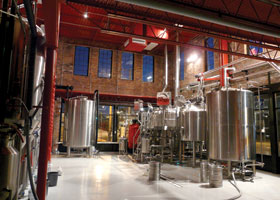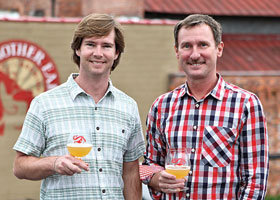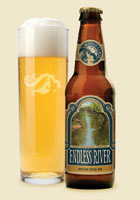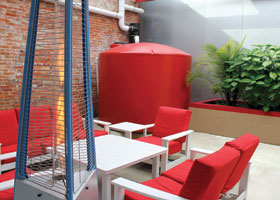Mother Earth Brewing Crafts Beer with an Environmental Ethos

Only the solar panels on the roof tip off visitors to Mother Earth Brewing’s serious environmental streak. The beer company founders, Trent Mooring and his father-in-law Stephen Hill, built a business centered on their lifestyle. “Our goal here is to make the best product, cause no unnecessary harm and use business to inspire and implement solutions to the environmental crisis,” says Mooring. Recycling is a given, but it involves more than turning junked cardboard into six-pack cartons and toilet paper. The brewery is located in a maze of buildings built between 1880 and 1950 that once housed a barbecue joint, pharmacy, stables and a clothing store. Arches stretch over greenways hidden from downtown Kinston, North Carolina, by walls of crumbly brick that wear patches of their past lives. Character like this can’t be bought. “We picked these buildings because they were the ugliest buildings in the community,” says Mooring. “This was a big part of Herritage Street that needed to be revitalized.”

Bricks and girders of the old walls became new walls, roofs and staircases. From the street you’d never know that nearly all the materials used for renovation inside once served another purpose. Insulation in the walls is made from old blue jeans, while the ceiling features sprayed, soybean-based insulation. The brewery’s furniture is made from reclaimed wood. These elements are not only more sustainable, but they help to keep costs down. “It’s all about education,” says Mooring. He stumbled upon most of these green alternatives with an Internet connection and a bit of spare time. Outside, a 2,500-gallon cistern and three 60-gallon barrels catch rainwater, while the solar panels soak up free energy. The organic compound ethylene glycol chills the fermentors, brite tanks and the walk-in cooler where the beer is stored, replacing the Freon typically used in breweries’ cooling set-ups. “If we learn something that is environmentally friendly, we want to do it,” says Hill. “We strive to do it.”

They also buy locally and dispose locally. Mother Earth Brewing sources their boxes and packaging from nearby Wilmington and their ingredients from local farmers. Not just peaches and blackberries, but hops as well. Hops—flowers that provide much of a beer’s flavor—grow in a street-side plot on the property and on Hill’s farm. They grow 59 rhizomes of Cascades and Chinook hops, enough for experimental brews and small batches. Though the family never expects to grow enough for the entire brewing operation, Hill plans on expanding the plot on his farm. Heading the other way is the brewery’s spent grain, a nutritious waste product that feeds Hill’s cows, horses, goats and chickens. Farmers and visitors who ask are given a portion of spent grain for free.

The founders grew up in Kinston, and centered their business’ and their families’ lives there. It never occurred to them to set up their brewery outside the struggling city, or to try to capitalize on the craft brewery explosions in the Pacific Northwest and New England. “This is home to us,” says Hill. “A production facility can be anywhere. We wanted to do something to help our own hometown.” It’s a shot in the arm that Kinston could have used decades ago, before more residents left behind its decaying downtown and declining agricultural center.
From obscure Dunkel lagers rescued from the German Dark Ages, to pale ales re-imagined with experimental hops, to thick oatmeal porters aged in secondhand bourbon barrels, Mother Earth Brewing has captured awards for the quality of its products and brought welcome attention to eastern North Carolina—the half of the state nobody talks about when they mention North Carolina’s blooming brewing industry. In its newfound spotlight, that downtown block in Kinston is once again seen as hip, as important, known for a burgeoning environmentalism. Not bad for a brewery that began selling beer three years ago.

